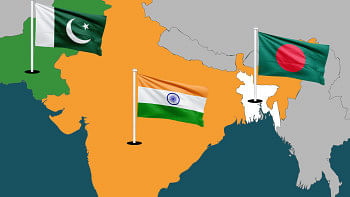Tagore and his plays

Rabindranath Tagore and his works are the heart and soul of Bangla literature. He is a writer of impeccably high stature, a renaissance man, a songwriter, a playwright, a philosopher, an educator and what not?
His songs express deep emotion, spirituality, mysticism and philosophy, while his short stories reflect society and circle around the lives of ordinary people. But it is his plays through which Tagore emerged as a social critic. Those who have read or watched his plays are familiar with his philosophical and allegorical themes. He is an inspiration across generations.

In a recent conversation with The Daily Star, three theatre directors shed light on diverse aspects of Tagore and his plays:
Veteran thespian Ataur Rahman zooms in on Tagore saying, “We take pride that Tagore was tremendously influenced by this land. I see the assimilation of world culture in him. He brought foreign traditions into Bangla and gave the world our native style. He is a master of the short story and no less than O' Henry or Maupassant. He is universal.”
“I think art can never be a carbon copy of life; rather it should evoke thoughts and be objective. Tagore's works incorporate allegories, abstractions and metaphors which make us think. He was open to changes and always talked of breaking the barriers so that the new can find its place. He was post-modern. The way he defined love in 'Shesher Kobita' is unmatched in Bangla literature,” Ataur Rahman added.
“Tagore also taught us to love and celebrate life. He held that death doesn't finish life, but leads to fulfillment. He could easily have stayed abroad and become another Bernard Shaw, but instead, he devoted himself to Bangla literature,” the veteran concluded.
Sudip Chakroborthy, a young theatre director and an Assistant Professor of Theatre and Performance Studies at the University of Dhaka, said, “Rabindranath's philosophy, presentation and depth of thoughts attract me.

I think we should explore Rabindranath more and more to fully discover his ingenuity, diversity and his views on life.”
“In his essay 'Rongomoncho', Tagore said oriental theatre is much more audience-oriented. Here, the audience is left alone so that they can perceive things in their way. This idea is perhaps my greatest learning from Tagore. He touched our hearts in a way that nobody can. Tagore is simple and that is his speciality,” Sudip Chakroborthy added.
Another young theatre activist, Aniruddha Kumar Shantonu, zooms in on Tagore plays, saying, “Tagore's philosophy of life and his perceptions are still relevant in these times. Rabindranath depicted society and gave bold messages through his short stories and plays. He was eloquent about the freedom of women in his 'Strir Potro', which we can still relate to. Moreover, there is space in his plays. It allows reinterpretation and rearrangement in the light of the new.”
Tagore through his works will continue to inspire generations. He was a master of literary arts who gave us a literary world to indulge in. Tagore took Bangla drama to a different stage through his immortal works.

 For all latest news, follow The Daily Star's Google News channel.
For all latest news, follow The Daily Star's Google News channel. 



Comments